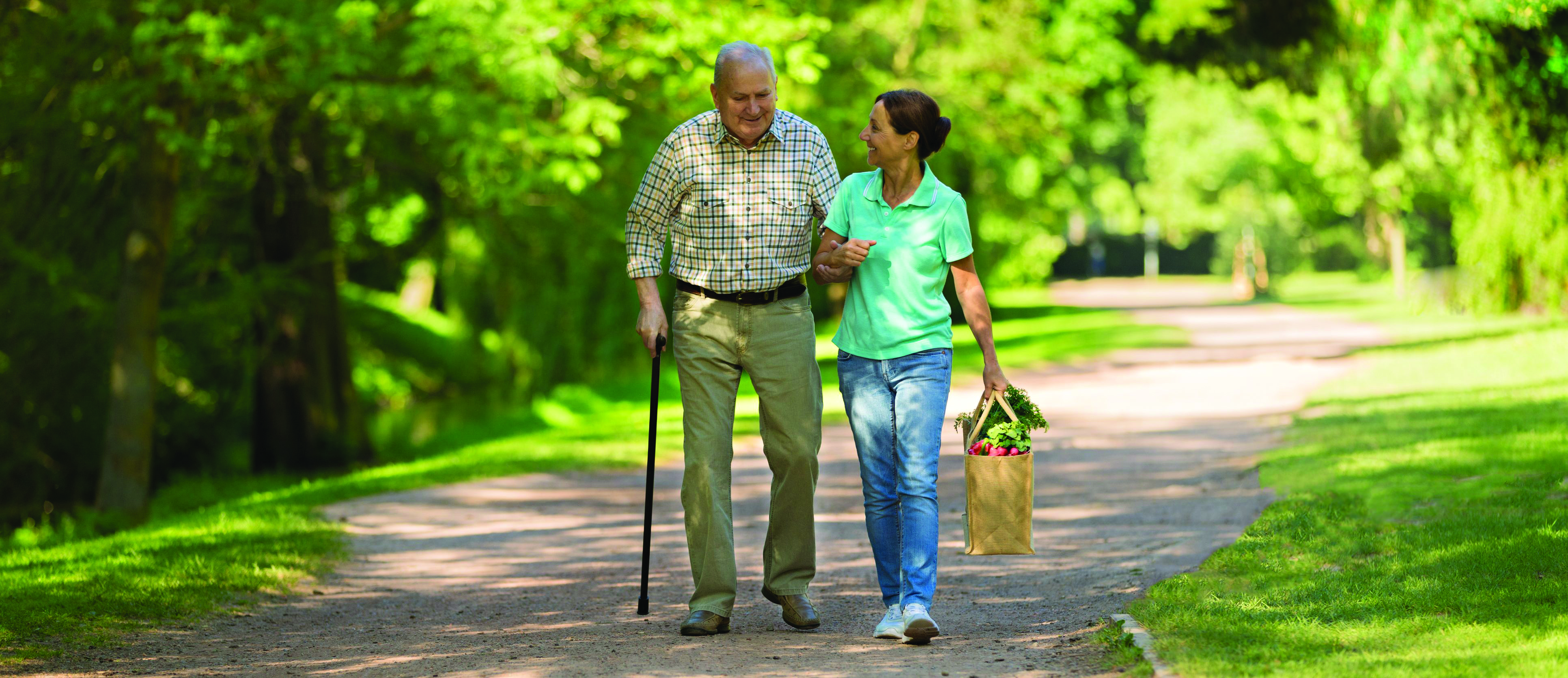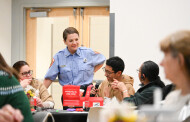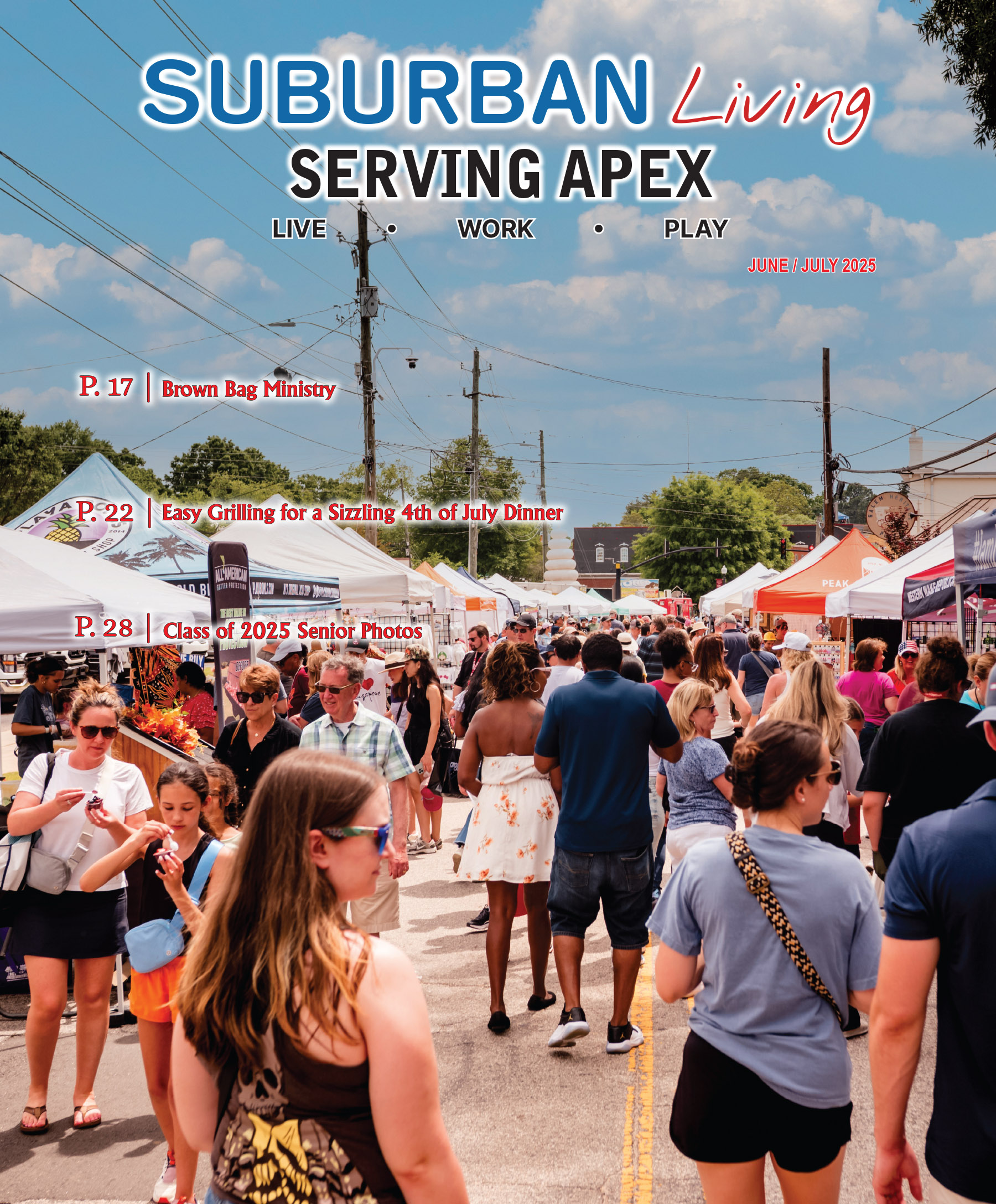The Center for Volunteer Caregiving is a gem of a nonprofit that connects caring volunteers from Apex and our neighboring communities with local seniors and adults with disabilities who need simple services such as a ride to the dentist, a run to the grocery store, or light housework. Elaine Whitford, Executive Director of The Center for Volunteer Caregiving and a lifelong volunteer, recently sat down with Suburban Living to share the benefits that the Center has provided Apex residents and the rest of Wake County for these last 30 years.
“We’re a unique agency,” she told us. “By harnessing the power of volunteers, we’re filling a need that is unmet. We are the only agency like us in North Carolina, and there’s only a handful like us across the nation.”
Through three programs, The Center for Volunteer Caregiving supports caregivers as well as serves senior adults and adults with disabilities, placing a priority on those with the most needs, socially and economically.
The first of these programs is Transportation.
Escorted transportation provides rides for medical appointments and access to health care and basic needs, making sure people have what is most important especially as they age and can no longer drive, or for those on a limited income.
For example, transportation volunteers escort those they help to do their grocery shopping, including seeing them safely home again. More than a drop-off service, Center volunteers call it being escorted “door through door.”
The Center’s largest program is In-Home Connections. Volunteers go into the homes of older adults or adults with disabilities for a friendly visit, benefiting those who may be socially isolated. In-Home Connections volunteers also assist with paperwork, and technology-related challenges, especially for the visually impaired.
For care recipients who aren’t tech savvy and are unable to leave the house, volunteers can help navigate a task like online grocery shopping. The volunteer takes the list and payment to pick up the groceries and, if the care receiver feels comfortable, even helps put the groceries away, turning an errand visit into a short friendly visit as well!
The third program is Caregiver Support. This is for the unpaid family caregivers who are taking care of a loved one 24/7, giving them a much-needed break from their duties and allowing them to go to their own appointments, run errands, or even just have lunch with a friend. Similar to a friendly visit, this program provides a benefit to the caregiver. Also for the family caregiver, The Center for Volunteer Caregiving offers a class called Powerful Tools for Caregivers. It’s a six-week class, held three times a year, that teaches skill building for the family caregiver, helping them to manage the challenges of taking care of a loved one.
The Center’s Caregiver Support Manager, a Licensed Clinical Social Worker (LCSW), checks in with family caregivers and provides resources from their community partners for such things as nutritional supplements, incontinence supplies, and condition-specific information from organizations like Dementia Alliance of North Carolina, The ALS Association, or the Parkinson’s Foundation.
“It’s about the people we serve,” Elaine said. “Every family situation is different and the Center’s volunteers help people continue to live independently as long as possible. We serve people with no family in the area, as well as those with lots of family, but who don’t receive any support from them. We serve the people who are on the edge of being able to live on their own and independently. Eighty to 85% of those that we assist are either at, below, or near the poverty line. These are people who are getting $300 a month on social security, and that’s it. There is no way they could purchase services.”
Volunteers are not certified nurses or certified caregivers. By law, they cannot—and do not—participate in what are considered to be activities of daily living, such as bathing, dressing, toileting, feeding, and giving medication. So, in situations where the needs of the recipient exceed the parameters of the volunteer, the Center steps in and tries to get them connected to resources for seniors, especially when it is no longer safe for them to live at home.
Elaine said, “Our volunteers, to many of our people, are family. They think of them as another child, or the child they never had. And our volunteers think of their care receivers the same way…‘this is another mother.’ They love them. They want to take care of them.”
This, according to Elaine, was one of the reasons the Center didn’t fold during the pandemic. A few volunteers who were older or had compromised immune systems had to back off a bit, but by the end of 2020, most of the volunteers were back. “Volunteers make it happen,” Elaine said.
Whether you’re 16 or 90 and have a few or many hours to give, volunteers are needed for all of the Center’s programs, in Apex and elsewhere in Wake County. There are even flexible opportunities for those who are available seasonally or certain months of the year, especially in the transportation program. Active volunteers have access to the ride calendar, for example, and can see if someone near them needs a ride, or they can see a complete list of those waiting for an In-Home volunteer or a Caregiver Respite volunteer. The staff takes great care in trying to match volunteers with people who need them, so they also try to capture a little description of a care receiver’s personality or specific desires. Five staff members, three program coordinators, and a volunteer program coordinator are all experienced in guiding people to find someone they may enjoy helping.
So, how does one become a volunteer? Contact The Center for Volunteer Caregiving at 1150 SE Maynard Road, Suite 210, Cary, NC 27511; volunteercaregiving.org; or call them at 919-460-0567. Looking for other ways to help? Consider financial assistance. The Center for Volunteer Caregiving is a 501(c)(3) nonprofit, making your donations fully tax-deductible.
“The phone rings here; it rings on everybody’s desk, and we answer it,” Elaine said. And they’ve been answering the call for 30 years.









